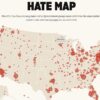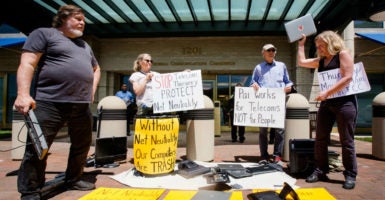The Federal Communications Commission voted 2-1 Thursday to start a process of undoing internet rules, commonly known as net neutrality, promulgated by the Obama-era FCC.
Undoing the 2015 Open Internet Order would “encourage more investment in broadband [and] more innovation,” James Gattuso, a senior research fellow at The Heritage Foundation, told The Daily Signal in an interview.
The order did two things. First, Gattuso said, it “declared all providers of broadband service to be common carriers under Title II of the Communications Act of 1934, which allows extensive regulation of “telecommunications services.”
This means that “the FCC got virtually unlimited authority to regulate [internet providers],” Gattuso said. Using this self-created authority, the FCC then imposed net neutrality restrictions on broadband providers. These rules essentially ban any unequal treatment of data being sent on the web. Thus, blocking or slowing content is banned, as is “paid prioritization,” effectively prohibiting discounts and premium pricing.
Making it worse, the ambiguity of the rules mean that providers end up going to the FCC for permission each time their service changes. “Every time [broadband service providers] do something, they have to go to the FCC and ask, ‘Does this violate any of the rules?’” Gattuso said.
The FCC just voted to seek comment on ending utility-style Internet regulation and returning to light-touch rules. #OpenMtgFCC
— The FCC (@FCC) May 18, 2017
The 2015 rule, Gattuso said, also banned practices that “unreasonably” limit consumer choice, or the ability of content providers such as Google or Netflix to make their offerings available to consumers.
The vote Thursday will commence a public comment period, which will allow Americans to weigh in on the decision to undo the 2015 Open Internet Order rules.
Ajit Pai, the FCC’s chairman who President Donald Trump appointed in January, said he believes in the free market rather than government control of the internet. Pai also said he wants the FCC to have more of a “light touch” in regard to regulations.
Mike Needham, chief executive officer of Heritage Action for America, the lobbying affiliate of The Heritage Foundation, said in a statement that this deregulation move is welcome.
“Chairman Pai and his colleagues at the FCC have demonstrated leadership by jump-starting the process of rolling back these so-called net neutrality rules,” Needham said. “The political left’s desire to treat internet service providers as publicly regulated utilities will erode choice and competition in the marketplace.”
Sen. Roger Wicker, R-Miss., supports the deregulation.
I support the work being done by @AjitPaiFCC & the @FCC to restore the #OpenInternet. https://t.co/uAsKzWZgWU
— Senator Roger Wicker (@SenatorWicker) May 18, 2017
Sen. Edward Markey, D-Mass., opposed the rule change.
Instead of preserving a free & open internet, Trump's @FCC is taking steps to restrict innovation & democratic expression. #NetNeutrality
— Ed Markey (@SenMarkey) May 18, 2017
Sen. Mike Lee, R-Utah, approved of the move by the FCC.
“I commend the FCC for taking the first step in returning the internet to the state of permissionless innovation it thrived under until just two short years ago,” Lee said in a statement, adding:
Today’s action begins the process of undoing the agency’s 2015 Open Internet Order, which upended the decades-old bipartisan consensus that consumers—not government regulators—should control the information superhighway.
Comments for the public comment period will be accepted until August 16, Gattuso said, with the final rule change likely to come in the fall.
































